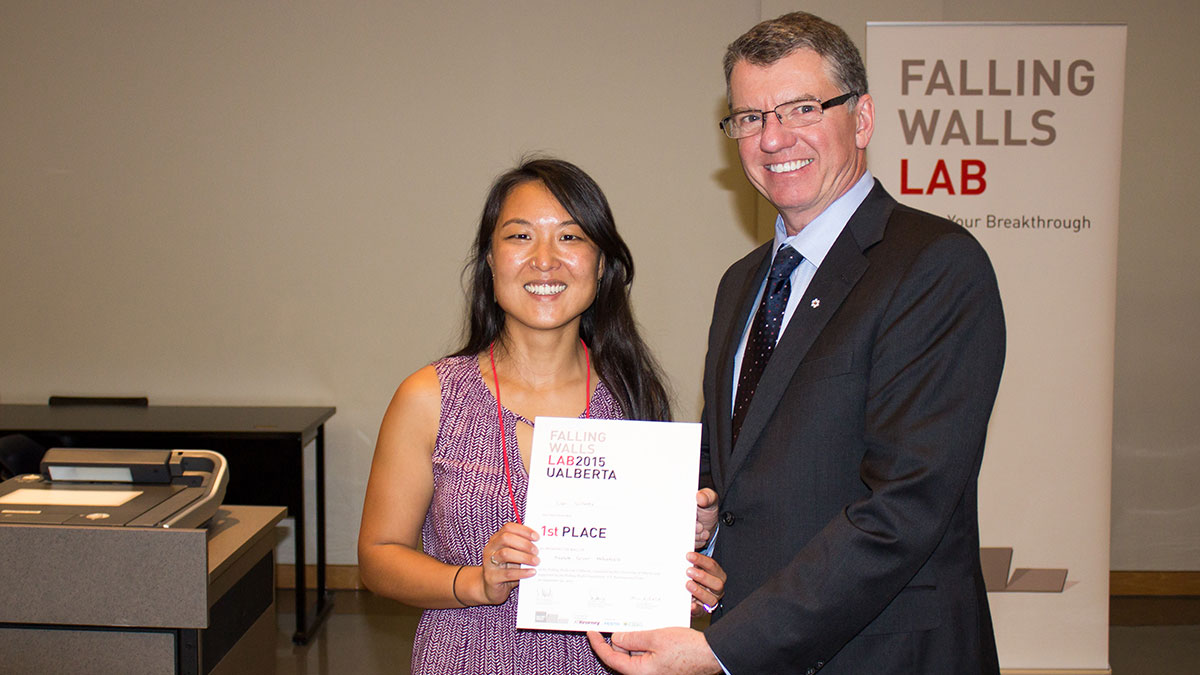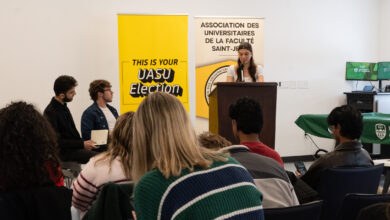 Jonah Angeles
Jonah AngelesInnovative, interdisciplinary research was showcased last week at the aptly-named Falling Walls Lab (FWL) competition.
16 competitors from across the University of Alberta presented before a panel of eight judges at the second annual Falling Walls Lab on Sept. 30. The prize for the three frontrunners was a trip to Berlin, Germany and an opportunity to present at the finale lab on the anniversary of the fall of the Berlin Wall in front of some of the biggest names in academia and research.
According to Mara Simmonds, communications associate at the Office of the Vice-President (Research), the purpose of the lab is to showcase research U of A students have done that has the potential to break down barriers across a variety of disciplines.
“The idea is to communicate your idea on how to break down walls in society, in medicine, in anything, so it’s not restrictive to any one area,” Simmonds said.
The FWL, which began in 2011 in Berlin, aims to build international and interdisciplinary connections between young academics and professionals from around the world. Though the first FWL was exclusive to Germany and continental Europe, it has since expanded to become an international conference.
Though the judging criteria — breakthrough factor, relevance and structure and performance — are outlined by the international coordinators in Berlin, Simmonds said the assessment of the proposals is extremely subjective. Though the U of A panel last year perceived “relevance” as referring to the extent of applicability, last year’s winning idea in Berlin was a glove that uses touch sensory technology to assist blind-deaf individuals in communicating.
“It’s a very small target group, relatively speaking, but it’s the fact that nobody’s ever done anything for them,” Simmonds said.
This year, the U of A’s panel judged proposals that tackled effective water treatment, obesity management and fatal police and mental health interactions. The first, second and third place winners who will be going to Berlin – Lian Willetts, Gem Shoute and Joshua Lee – presented on prostate cancer metastasis, rigid electronics and genetic medicine, respectively.
Nermeen Youssef, the second-place winner at last year’s international finale and a judge on the panel for this year’s competition in Edmonton, said she believes the finalists will do the U of A proud when presenting in Berlin.
“I would only advise them to soak in the experience, network with the other presenters and be inspired by the plethora of ideas presented at the conference,” she said.
Youssef’s pitch, entitled “Breaking the Wall of Type 1 Diabetes,” illustrated a road to needle-free management of Type 1 diabetes. Now a PhD graduate in pharmacology from the U of A’s Faculty of Dentistry and Medicine, she said the conference opened doors for her.
“I got to meet several established intellectuals in my field, as well as in other disciplines,” Youssef said. “It also shed light on our project, which invited constructive feedback to help develop the idea further.
Simmonds said she believes conferences like the FWL are important not only for the university and competing individuals, but also for audiences and the public.
“It’s a way to communicate what’s happening here (in a way) so people can understand the importance and the relevance of it,” Simmonds said.
“Saying, ‘You can drop your phone and it wouldn’t break’ … anyone can understand that. They may not understand the complex science behind it, but it’s a way to make a connection and show the value of the research.”




